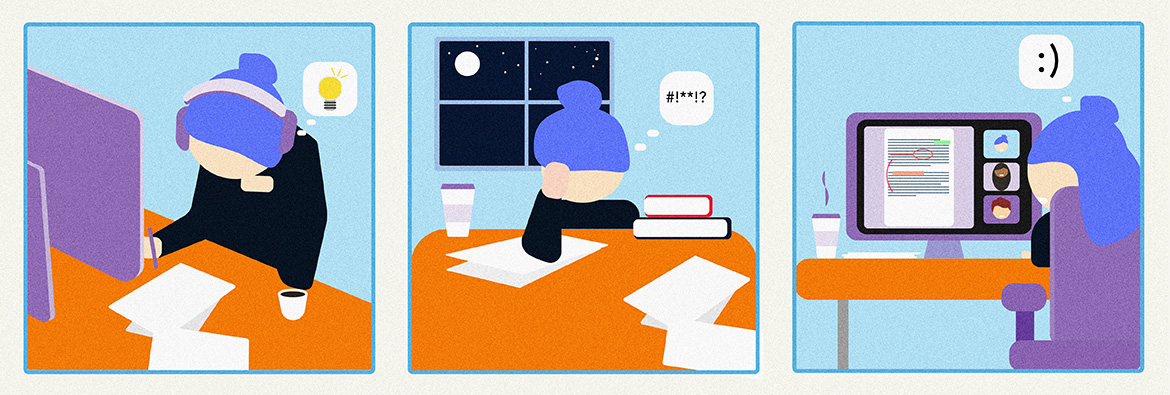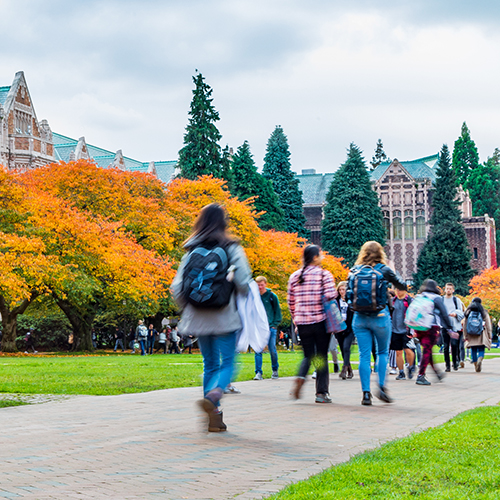
Like most doctoral students, Michelle Pham felt a mix of emotions as she embarked on her doctoral dissertation. Nervous. Excited. Overwhelmed. Inadequate. And -- because writing is a solitary venture — alone.
“Writing can be very isolating,” says Pham (PhD, Philosophy, 2020). “For me, writing alone regularly with little feedback led me to question my own confidence and abilities.”
Pham turned to the Odegaard Writing and Research Center (OWRC), which offers a range of writing resources for graduate and undergraduate students. She began attending OWRC’s Open Writing Circles, a weekly offering that encourages graduate students to carve out designated time for writing in the company of peers. “It was just what I needed to push through,” says Pham.
OWRC, based in the College of Arts & Sciences, serves students from across campus, though the majority come from writing-intensive fields in the humanities and social sciences. While many universities’ writing centers focus solely on undergraduates, OWRC offers several programs — the weekly writing circles, an annual dissertation retreat, a writing podcast, one-on-one tutoring — that address the specific needs of graduate students.
Writing with Higher Stakes
A common misconception is that graduate students have mastered writing by the time they reach graduate school and no longer need writing help. In reality, most face challenges they never encountered before. Their writing projects are more complex than those of undergraduates, with higher stakes. Master’s theses can be more than 100 pages; dissertations are equivalent to writing a book manuscript — and sometimes become published books. They are massive undertakings.
Writing your dissertation can be both a joyful and excruciating experience.
“Graduate students are often not just writing for a particular assignment or class,” says OWRC director Erin Cotter. “They are writing research-focused articles, dissertations, grants, and other documents that will directly impact their careers. They need to learn how to continue to write and refine and work on questions that are really big, questions that they’re working on for years.”
The most popular OWRC offering for graduate students, helpful at every stage of their writing process, is one-on-one tutoring. Some students schedule a single appointment to tackle a specific concern; others visit regularly as they work through a major project. OWRC’s website features biographies of its approximately 40 tutors, so that students can choose a tutor they feel is suited to their project. “Approximately a third of our tutors are graduate students,” says Cotter. “We purposely hire master’s and PhD students at different stages of graduate study and across different disciplines.”
Creating a Community for Writing
For graduate students seeking a writing community or dedicated time for writing, Open Writing Circles is another helpful resource. The concept is simple: each week, graduate students gather for a 90-minute session—online since COVID—to work on their writing individually but in the company of others. At the beginning of each session, participants share a goal for that session; at the end they report back on their progress.
“There’s this component of mutual accountability,” says Hope St. John, OWRC graduate student coordinator and PhD student in anthropology, who leads the Open Writing Circles. “There’s also the camaraderie of being with people who are experiencing the same kind of things, dealing with the same kinds of questions, which can sometimes really make a difference. Writing in community provides opportunities to share information, experiences, and strategies.”

Some students attend a single session of the Open Writing Circles as they work through a specific project. Others, like Pham, come regularly as part of their writing routine. Pham started participating in her sixth year of graduate school, frustrated by the slow progress in her writing. “I knew I needed to do something different, and I thought the writing circle would help,” Pham recalls. “Allocating a couple of hours each week to doing a difficult activity in concert with others, and sharing my progress (or lack thereof) and my frustrations was empowering.”
Pham also participated in OWRC’s Dissertation Retreat. Offered each June, the weeklong retreat is specifically for students immersed in dissertation writing. The program combines tutoring, writing workshops, and sessions on self care and mindfulness to address the emotional toll of completing a dissertation.
The Writing Process Examined
The pandemic dashed plans for a 2020 dissertation retreat, and with COVID still raging, OWRC staff must decide how to proceed in 2021. But the pandemic has already inspired another project: Write for You, a podcast about writing.
Each “Write for You” episode is a conversation between two graduate students as they discuss their writing process, challenges they’ve faced, and strategies they’ve found helpful. The students — a different pair each episode — come from a wide range of disciplines. “We’re not looking for someone to be an expert on writing,” St. John says of the podcast guests. “We’re more interested in how people actually write every day.”
OWRC produced four podcast episodes in 2020, with five more in the works for 2021. “I hope that the podcast helps fellow dissertators out there feel less alone in the process,” says Pham, featured in episode 4. “Writing your dissertation can be both a joyful and excruciating experience.”
Joyful and excruciating — and different for every student.
“Writing in graduate school is messy and hard and there isn’t a singular route to successful writing,” says St. John. “It is a very personal endeavor to engage in scholarship. Our goal at OWRC is to provide graduate students with the tools and resources to figure out what is going to work for them. We’re here to help them continue to develop as writers.”
More Stories

Meet Our 2024 Graduate Medalists
Meet the three students selected by the College of Arts & Sciences as 2024 Graduate Medalists for their accomplishments.

Meet Our 2023 Graduate Medalists
Three graduate students who earned doctoral degrees in spring 2023 received the Graduate Medal from the College of Arts & Sciences.

For the Love of Hustle
Abdiel Jacobsen, graduating with an MFA in dance, found creative ways to share Latin Hustle, their favorite dance, with students and the wider community.